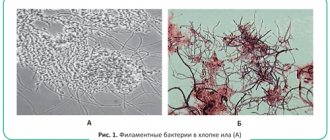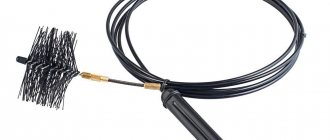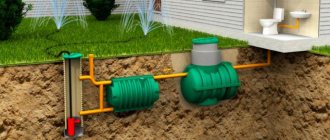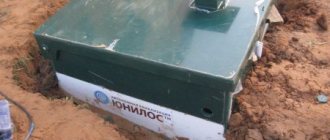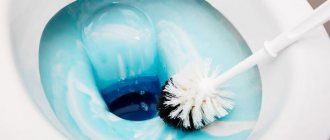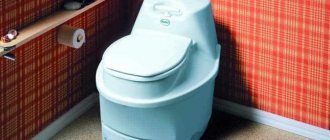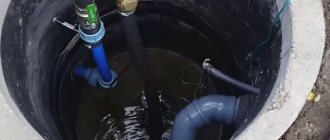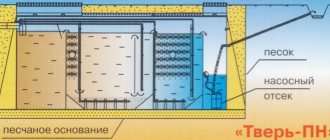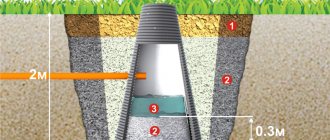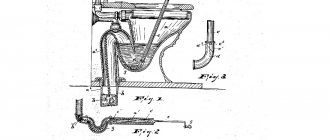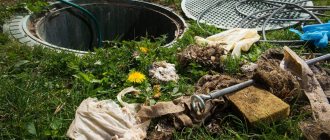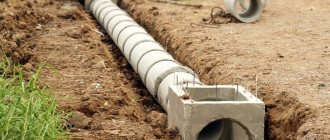When to use cleaning products
Regular maintenance of the septic tank ensures long-term, trouble-free operation. To extend this period, it is necessary to use chemistry that accelerates the process of decomposition of wastewater.
The right choice allows you to:
- speed up the process of waste decomposition in sewage;
- dissolve sediment on the bottom and walls of settling tanks;
- support the work of beneficial microorganisms and eliminate harmful ones, disinfect hazardous waste;
- reduce sludge sediment in the chambers, reducing the number of calls to the sewer truck;
- eliminate unpleasant odors.
During the maintenance process, it is important not to use substances that can lead to the death of the microflora of the sump and the release of untreated wastewater into the ground.
Safe washing powder: what to choose
When installing a turnkey septic tank, it doesn’t hurt to decide on the powders to use. Look at the composition, what does not include:
- chlorine;
- surfactant;
- phenol;
- petroleum products.
Aggressive washing powders with a bleaching effect are prohibited. For infrequent weekly washing (up to 2 times) the following are suitable:
- Tide;
- Gloss;
- Persil;
- Ariel;
- Sarma.
Moderate consumption of conventional products will not harm aerobic bacteria in biological stations.
For frequent daily washing, it is advisable to use soft washing powders from the following brands:
- Frosch (Germany);
- BioMio (Denmark);
- Ecodoo (France);
- Chistown, Molecola (Russia);
When installing a turnkey septic tank, powders for washing children's clothes are in demand, which contain small amounts of surfactants and are free of phosphates. This group includes: Meine Liebe, Burti Compact Baby, Umka, Babyline, Tobby Kids.
How not to harm chemicals and how to use them correctly
You can only use detergents that are safe for septic tanks and do not contain chlorine, phosphates, acids, alkalis, or petrochemical elements.
Shampoos and hair conditioners, shower gels, toothpastes, soaps, perfumes, dishwashing liquid, etc. are not excluded. For example, Sinergetic is a biodegradable laundry liquid without chlorine.
When using chemicals and to improve the treatment of domestic wastewater and sedimentation tanks, it is necessary to obtain qualified information about the substance. It is important to know what the consequences may be from using the drug for bioflora in chambers and from purified water entering the ground.
When operating an autonomous sewage disposal system, it is important to understand what reasons can reduce the efficiency of waste processing, lead to malfunctions and stop the purification process:
- Seasonal use of the sewer system (only in summer). In this case, the bioflora may die and it will be necessary to re-establish the process of biological processing of sewage. During long breaks in the use of the sump, preservation preparations are used that quickly restore the functionality of microorganisms.
- Medicines that got through the sewer.
- Used household chemicals with antibacterial additives.
- Aggressive chemicals after cleaning.
Nitrate oxidizers clean wastewater disposal wells during periods of low bacterial activity, and in the summer they help get rid of hardened waste and dense sludge at the bottom of the sump, improving the drainage of purified water.
During constant operation of the treatment structure, including the winter period, chemical preparations for septic tanks are used that are able to withstand low temperatures without reducing activity.
"White list" of some funds
Cleaning and detergents do not contain chlorine, aggressive surfactants, phosphates, toxic dyes, fragrances or dangerous preservatives. Using only natural active ingredients, surfactants from plants.
| Manufacturer | Product Name |
| Ecover (Germany, Belgium) | Washing powder without phosphates, "Ecover", 1200 g and 2650 g. Liquid detergent "Ecover" for washing wool and silk, 1 l Liquid detergent "Ecover" for washing, 1.5 l. Softener "Ecover" for laundry (conditioner) Floral, 1 l. "Ecover" fabric softener (conditioner) Solar, 1 l. "Ecover" fabric bleach, 400 g. "Ecover" stain remover, 200 ml. "Ecover" ecological spray for cleaning any surfaces, 500 ml. "Ecover" ecological creamy cleaner ", 500 ml Ecological product "Ecover" for cleaning windows and glass surfaces, 500 ml Ecological product for cleaning plumbing equipment Ocean freshness "Ecover ", 750 ml Ecological product for cleaning bathroom equipment with pine aroma "Ecover", 750 ml Ecological dishwashing liquid with grapefruit and green tea “Ecover”, 500 ml Ecological dishwashing liquid with lemon and aloe vera “Ecover”, 500 ml Ecological tablets for the dishwasher “Ecover”. Packaging: 500 g or 25 tablets |
| Frosch (Germany) | FROSCH Laundry detergent concentrate Ultra/Citrus FROSCH Washing gel with Aloe VeraFROSCH Fabric softener “Freshness” 750 ml FROSCH Stain remover gel with active oxygen 975 mlFROSCH Universal cleaner Lavender 1 l FROSCH Universal cleaner Lime 1 lFROSCH / FROSH Toilet bowl cleaner with lavender extracts 750 ml FROSCH / FROSH Toilet bowl cleaner with lemon extract 750 mlFROSCH / FROSH Vital Vitamin dish balm FROSCH / FROSH Cleansing Balm-Gel for dishes Citrus 500 ml, 750 ml FROSCH / FROSH Tablets for dishwashers “All in one” Soda |
| AlmaWin (Germany) | Phosphate-free washing powder ALMAVIN, BIO 1.08 kg Liquid detergent ALMAVIN for washing wool and silk, BIO 0.75 l Bile soap ALMAVIN for removing stains, BIO 0.1 kg Cleaning agent ALMAVIN with orange oil, 0.5 l Cleaning agent ALMAVIN for glass and mirrors, 500 ml. Environmentally friendly cleaner ALMAVIN for toilet bowls, 0.5 l. ALMAVIN detergent for manual dishwashing, 0.5 l. ALMAVIN tablets for dishwasher, 25 pcs. |
| KIILTO (Finland) | Ready-made product KIILTO Milki for removing limescale spray, 0.5 l Ecological cleaning product KIILTO Koti Eki for cleaning rooms and washing carpets, 1 l Kiilto WC-PUHDISTAJA SPRAY spray for eliminating unpleasant odors in the toilet, Lavender 0.5 l KIILTO Asteri dishwashing detergent, 1 l |
| Klar (Germany) | CLAR SOAP NUT WASHING LIQUID FOR COLORED AND WHITE LINEN HYPOALLERGENIC 125 ML KLAR HYPOALLERGENIC LIQUID FOR WASHING COLORED LAUNDRY KLAR WASHING POWDER CONCENTRATE FOR COLORED LAUNDRY HYPOALLERGENIC ETC. https://www.eco-tut.ru |
| Sonett (Germany) |
https://www.biogradproduct.ru/sonett-produce |
| EcoLife | washing probiotics https://www.ecolife.zp.ua |
| ECODOO (France) |
https://www.naturworld.ru/catalog/brands/detail.php?MANUFACTURER=1551 |
| CHRISAL (Belgium) | CHRISAL detergents are aqueous solutions of organic compounds. The products do not contain such aggressive inclusions as chlorine, phosphates, phthalates, optical brighteners, weakly biodegradable surfactants, and organic acids. https://www.chrisal-product.ru |
| Aqualon (Aqualon, Russia) | Not all products are biodegradable, but some are:
|
| Chistown (Eurasian Soap Company LLC, Russia, Rostov-on-Don) | The products do not contain phosphates, chlorine, zeolites, a-surfactants and other toxic substances; made from natural raw materials; contain more than 30% natural soap based on vegetable fats. Almost completely biodegradable https://chistown.ru |
| Ecomax (Asia, part of eCosway) |
https://alzal-ecosw.ru/production/bytovaya-khimiya |
| Faith in nature (UK) |
Without SLS/SLES, parabens, etc., natural composition (almost entirely plant-based). In the soap description: “suitable for autonomous cleaning systems, septic tanks, etc.; The product is quickly and completely biodegradable.” https://www.sver4ok.ru/page/faith-in-nature.html |
| Garden |
“...environmentally friendly and safe for humans and the environment:... 100% natural ingredients; ...DOES NOT contain phosphates, optical brighteners, aggressive surfactants, zeolites, silicates, dyes, petroleum products, or other toxic substances and is safe to use; ...does not cause allergies or skin irritation; ...completely biodegradable in nature; Does not harm the environment and water sources; water after use is suitable for watering the garden https://my-shop.ru/shop/products/1771763.html |
| iHerb | https://ru.iherb.com/Laundry-Detergent |
| SSHerbals (India) | soap nuts
https://www.biobrands.ru/brands/ss-herbals.html |
| Tierra Verde, SRO (Yellow&Blue) (Czech Republic) | soap tree fruit
https://eshop.tierraverde.cz |
Types of cleaning chemistry
It is important to understand the effects of products offered on the market, study the types of drugs, the positive and negative properties of chemical cleaners.
Owners of private houses and country houses used and, unfortunately, continue to use traditional methods and aggressive preparations to clean wastewater disposal facilities, which include:
- Formaldehyde is an effective cleaning agent, but is toxic. Its use kills beneficial microorganisms and stops biological treatment processes. When released into groundwater, formaldehyde is very dangerous to human health;
- caustic soda - alkali, sodium hydroxide, toxic, but will corrode almost any organic matter, volatile. Caustic, in the form of a white powder, sometimes in granules;
- bleach – has a short-term effect on eliminating odor and corrodes solid waste in drains. Chlorination processes negatively affect the microflora of the settling tank and are environmentally hazardous;
- ammonium compounds - accelerate decomposition and eliminate unpleasant odors from the septic tank. But the drug cannot neutralize household chemicals and does not exclude a negative effect on cleaning microorganisms in the septic tank and the environment;
- nitrate oxidizers - substances used in the production of fertilizers in the preparation. The chemicals do not negatively affect the microorganisms of the treatment plant, neutralize aggressive household chemicals in wastewater, remove unpleasant odors, and dilute solid waste. The cost of drugs is high.
All of the above effectively clean fatty deposits on the walls of chambers, liquefy sediment at the bottom of the structure, remove blockages and neutralize unpleasant odors of drains.
Bleach and formaldehyde are prohibited for use. These substances are also not used as components in modern chemical preparations that accelerate the purification of sewage.
Recommended nitrate products work in both positive and negative temperatures. They speed up the process of wastewater treatment without pumping out liquid, improve the quality of purified water draining through the sump into the ground.
Among the drugs that process sewage and clean chambers, “Devon-Il” is in the ranking of the best in popularity.
Main substances harmful to activated sludge
| Name of substance | Negative Impact |
| Chlorine compounds | The mechanism of action of chlorine compounds on activated sludge microorganisms is through interaction with the components of the microorganism's cell, primarily with enzymes, such as dehydrogenases, which catalyze redox reactions in the cell. The loss of biological activity of enzymes can occur as a result of oxidation, chlorination, and substitution reactions. Changes in the structure of enzymes lead to metabolic disorders in the microorganism cell and its death. |
| Anionic surfactants (surfactants) | Surfactants are extremely active chemical compounds. When activated sludge enters the cells of microorganisms, surfactants accumulate on cell membranes and, at a certain concentration, can cause disruption of the most important biochemical processes occurring in them, affecting the function and integrity of the cell itself. Surfactants significantly change the intensity of redox reactions, affect the activity of a number of important enzymes, and disrupt protein, carbohydrate and fat metabolism. Anionic surfactants are especially aggressive in their actions; they practically do not decompose biologically and can cause serious disturbances in the functioning of activated sludge. This is one of the reasons why Western European countries impose strict restrictions on the use of anionic surfactants. At best, their content should not exceed 2-7%. |
| Phosphates | The presence of phosphate additives leads to a significant increase in the toxic properties of anionic surfactants (A-surfactants). Phosphates have been banned in European countries for almost 20 years. |
| Phosphonates | They are salts of organic phosphorus compounds. They stabilize bleaches and prevent calcium precipitation during the washing process. They are poorly biodegradable, but are partially retained in sludge during wastewater treatment. The presence of phosphate additives in powders leads to a significant increase in the toxic (poisonous) properties of A-surfactants. |
What is also prohibited from being dumped into the TOPAS station:
What is allowed to be dumped into the TOPAS station:
|
Correct operation of chemicals
The high-quality operation of an autonomous sewage system depends on joint efforts in the processing of sewage, bioflora and chemistry. Bacteria successfully process organic matter, and chemicals help well in the decomposition of solid sludge and fat-like deposits on the walls and bottom of wells, which impede the drainage of purified water.
But biological reagents work at positive temperatures, and chemicals can decompose waste even at negative temperatures, supporting the vital activity of bacteria. But this only applies to nitrate oxidizers, which do not harm the population of microorganisms and are safe for nature and humans.
The symbiosis of biological agents and nitrate oxidizers will allow the operation of a septic tank with minimal involvement of sewage disposal equipment.
How to properly clean?
To clean the toilet, you will first need to carefully read the composition of the product and its recommended dosage. We recommend studying the proportions of the components included in the product, even if it is indicated on the front side that use with septic tanks is acceptable.
After this, cleaning takes place in several stages:
- Washing the bowl. Depending on the method of using the composition, you can apply it and wash it off immediately or leave it on for a while. The work uses a sponge or a special brush. Particular attention should be paid to the area under the rim - a lot of bacteria accumulate there. Another risk area is the drain area filled with water. Urinary stone deposits may form there.
- Wash the outside of the bowl and tank . If there is a septic tank, you also need to clean the outside of the toilet using safe products, because they will end up in the drain.
- Cleaning small parts. We recommend thoroughly wiping the areas near the toilet seat and the rim itself.
Even if the packaging does not indicate this, it is best to leave the product on for a while so that it can cope with bacteria and plaque. This is especially important for biodegradable substances because their action time is longer than that of the aggressive substances that many are accustomed to.
We have discussed in detail what cleaning products can be used in a septic tank. Remember that even if the house is connected to a cesspool, there is no septic tank and the risks are small, it is better to give preference to safe compounds . The reason is simple - aggressive substances can harm the environment, plants and trees on your property and among your neighbors. Take responsibility for keeping your toilet clean and you won't have any problems.
You may also be interested in our class=”aligncenter” width=”934″ height=”652″[/img] Maintenance of mobile toilet cabins
Sludge works
Septic tank pumping
| How to contact us: | |||
| +7 | Request a call back | ||
| [email protected] | Order a service online | ||
How to clean with household chemicals
A septic tank product in the form of chemicals made from a nitrate oxidizer is the most effective and environmentally sound treatment of wastewater from autonomous sewer systems, especially in winter.
It is not difficult to organize the process of cleaning the sump with your own hands, by consistently following the recommendations of the instructions for a particular product.
Cleaning concrete structures is a complex process, unlike plastic septic tanks. On the walls of the chambers, grease and other waste deposits are retained due to the porosity of the material and are removed after complete decomposition.
To speed up waste processing, it is important to select preparations that are compatible with septic tank materials to clean the chambers of fatty deposits.
Knowledge of the use of chemical treatment products and the operation of treatment facilities will allow you to correctly select and use drugs that speed up the process of processing and purification of wastewater.
The use of chemicals to clean septic tanks from solid waste and grease deposits is especially important in winter, while microorganisms are preserved.
1. The chemical reagent "Devon-Il" helps remove plugs from sewage in the sewer system, dilutes hardened sludge deposits and waste.
For the effective action of the substance, in accordance with the instructions, you must:
- Pour 100 ml monthly into the home drain. Getting into the septic tank wells, it eliminates and dilutes solid waste and sludge;
- 0.5–1 l per 1 cubic meter. m of wastewater should be poured into the receiving chamber when pumping out liquid to neutralize the odor;
- pour 100–200 ml 3 times a day into the sewer system in the house or treatment facility to remove a large layer of silt or blockage.
Compositions for cleaning sewer pipes
In addition to preparations for waste treatment, chemicals are widely used to clean sewers in a private home. These are compositions intended for treating the internal surface of pipelines. They dissolve fatty deposits and destroy blockages. There are different forms of formulations on sale:
- dry powders;
- granules;
- liquid or gel solutions.
The most popular compositions are:
- Tiret. Gel with increased chemical activity. It is used not only as a cleaning agent, but also to prevent blockages;
- Mole. A gel-like composition that is placed in pipes and washed with hot water after 20 minutes;
- Mister Muscle. There are formulations in the form of gel, granules or foam. They cope well with fat deposits;
- Floop. Available in powder or gel form, which are simply placed in the plumbing drain hole;
- Bagi Pothan. Active granules that can even dissolve hair, paper, lime deposits or fish scales;
- Nornik. Produced in Poland. Available in granule form. The composition is environmentally friendly.
The above list cannot be called exhaustive, since new varieties appear on sale every day. They have a strengthened formula and increased effectiveness.
Chemistry useful for septic tanks
Chemistry can be harmful and neutral; there is also one that can bring real help to the operation of a septic tank and improve the quality of wastewater treatment. We are talking about so-called biological activators, which not only do not have a detrimental effect, but, on the contrary, increase the performance of bacteria in the septic tank. Thanks to such preparations, you can quickly deal with blockages, remove accumulations of fat and sediment from sewer pipes, and also run local treatment plants after preservation.
Today there are a lot of such drugs; they are produced in sufficient quantities not only by foreign manufacturers, but also by the domestic chemical industry. For example, the drugs Mikrozim, Doctor Robik, Atmosbio, Vodogray and other products have proven themselves to be excellent. All of them contain dormant colonies of beneficial anaerobic bacteria, the protective shell of which dissolves when they enter water, and the microorganisms wake up to life. The drugs are very different in their final purpose. Thus, you can purchase a drug that resists the spread of odor, tablets that allow you to remove blockages, concentrates for clearing and clearing sewer pipes, etc. Moreover, the drugs can act both in a short period of time and for several weeks.
The domestic drug “Vodograi” has proven itself well.
Chemicals for a septic tank can be both harmful and beneficial. If your household does not have a central sewer network, where chemical impurities are purified centrally, before the wastewater enters aerobic storage tanks, it means that you use local treatment facilities or a private home septic tank.
For septic tanks such as, for example, products from the Topas, Biodeka, etc. lines, the use of household chemicals is quite limited. That is, you can use toothpaste, soap, mild dishwashing detergent, shampoos and hair conditioners. All this will not cause much harm to the operation of the devices. But other substances that are sold in hardware stores must be used quite carefully. Today, the choice of harmless products is quite large. These same remedies will also be useful in families with children or people with allergies. So your thoughtful attitude to the work of the treatment plant will help not only the bacteria in the septic tank, but also the people living in the house.
List of detergents safe for septic tanks
The rating includes compounds that do not contain aggressive components, but effectively cope with the removal of contaminants.
For washing clothes
The main selection criteria were health safety, absence of phosphates and anionic surfactants.
Frosch
Natural, eco-friendly washing powder. Thanks to the presence of raw materials of exclusively natural origin in the recipe, it gently washes fabrics. They do not cause allergic reactions even on delicate baby skin.
ECOVER
The product line is represented by several detergents. All of them are made from plant ingredients. The active formula completely dissolves in water at 30 degrees. This allows you to more effectively wash away contaminants from fabrics.
Dishwasher detergents
Presented with effective natural products with low foaming.
OPPO tablets
The formula contains only organic compounds. They do an excellent job of removing grease and other difficult stains on dishes. They do not leave behind streaks and prevent the appearance of lime deposits on the heating elements.
ECOVER tablets
Contains all three components necessary to clean dishes in the dishwasher. This makes it possible to completely eliminate the use of aggressive substances during the washing process.
Detergents for bathrooms
They have an antiseptic and disinfectant effect. At the same time, the recipe does not contain chlorine, ammonia, synthetic acids and alkalis.
Eco-gel ZERO
The main active ingredients are jasmine extract and blue clay. The substances cope with daily pollution and remove limescale and rusty stains from plumbing fixtures.
Tablets for cesspools
A very convenient form of release of biological drugs that does not require further processing. The tablets are lowered into a pit for collecting sewage (if according to the instructions they do not need to be diluted with water), taking into account its volume, after which they destroy the sewer odor and dissolve solid bottom sediments. The rating presents the safest and most effective products according to customer reviews. We selected them from 10 nominees.
Happy summer resident
Bioactivator for country toilets and cesspools, which eliminates the current unpleasant odor and prevents its occurrence in the future. One tablet is valid for 1-2 months and is designed for a container of up to 1500 liters. The product decomposes fats, feces, and organic matter. The composition includes filler and dry soil microorganisms, which fight the problem.
The Happy Summer Resident is suitable for both open pits that do not have an artificial bottom, as well as open pits. In this case, after the residues are broken down, water will be absorbed into the ground. Thus, the fullness of the container is reduced and the intervals between calls for vacuum cleaners are shortened. The drug is active for 3 years from the date of production.
Advantages
- The effectiveness has been confirmed by the research center of the Russian State Agrarian University-Moscow Agricultural Academy;
- Fast action;
- Copes well with both odor and prevention;
- The packaging lasts a long time;
- Harmless to the soil.
Flaws
- Small package weighing 5 g;
- When combined with disinfectants, effectiveness decreases.
This product for cesspools works best in a temperature range from +10 to +40°C, so waste effectively decomposes almost all year round, except winter.
BioExpert
A universal preparation, suitable not only for cesspools, but also for sewers and septic tanks. The package contains 6 effervescent tablets, packaged in convenient jars. Each of them includes over 1 billion microorganisms that break down waste and prevent the appearance of unpleasant odors. They are harmless to humans and soil and do not disturb its composition.
BioExpert tablets accelerate the dissolution of fecal sediment at the bottom, process waste into compost and prevent the release of gas. The drug is safe for plastic rings, which are often used to construct a cesspool. It does not destroy the walls of the container and does not worsen the condition of the soil. The dosage of the product is small - you need to dilute 1 tablet in 5 liters of water, then pour the finished liquid into the recess.
Advantages
- Shelf life – 24 months;
- Long lasting;
- Fast reaction;
- Various effects;
- Facilitates the distribution of sewage inside the pit.
Flaws
- 4 tables enough for volume up to 16 cubic meters. m.
The purpose of the product is not just to remove the unpleasant odor, but also to make the process of cleaning the cesspool from human waste as easy as possible. To do this, the drug processes the contents of the structure into liquid form. Thanks to this action, it is possible to reduce the financial burden on the budget when calling vacuum cleaners.
Rules for choosing cleaning chemicals
When choosing products for cleaning cesspools, it is necessary to determine in advance how the processed wastewater will be used in the future. If you give preference to chemicals, then treated wastewater cannot be used as fertilizer. The only exception is nitrate salts, which are the least dangerous and non-toxic.
Also, when purchasing chemicals, you should take into account the material of the walls near the cesspool and the presence of plastic or metal pipes in it. Since most products are aggressive to some materials. If a fecal pump is used when pumping out drainage, then the choice of chemistry should be treated with caution and care. Since the surface of the pump will suffer the most from aggressive drugs.
Also, when purchasing chemicals, you need to consider whether detergents and household chemicals end up in the cesspool. Under their influence, some drugs lose their effectiveness.
Chemical preparations for outdoor toilets effectively combat the assigned tasks: they kill the pungent odor, process fecal matter, and disinfect surfaces.
